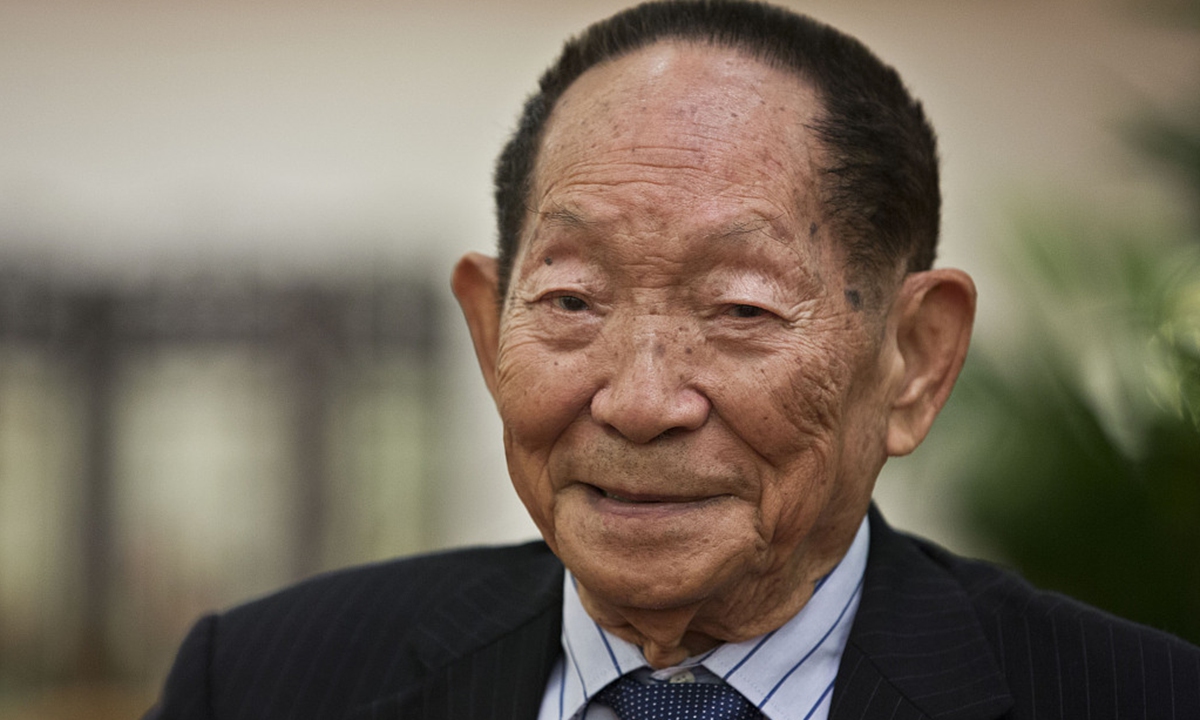
Yuan Longping Photo: VCG
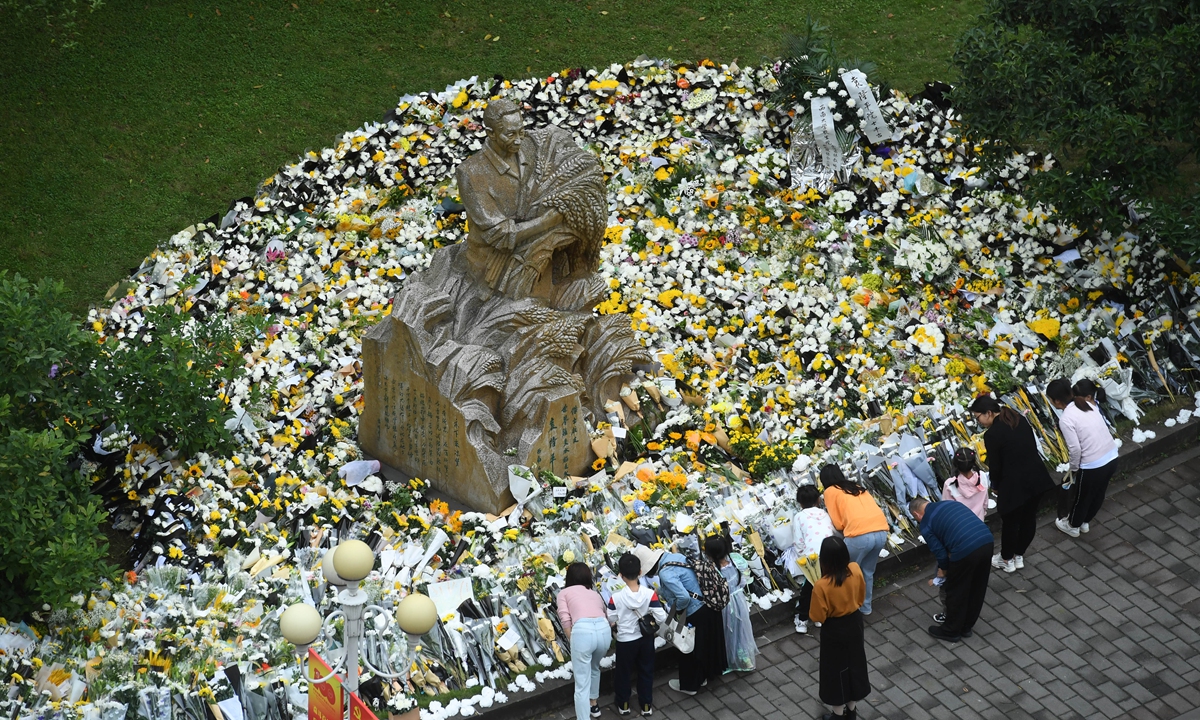
Students present flowers in front of a statue of Yuan Longping at Southwest University in southwest China's Chongqing on Sunday. Yuan, renowned for developing the first hybrid rice strain that relieved countless people of hunger, died of organ failure at 91 on Saturday. Yuan graduated from the Southwest Agricultural College (now the Southwest University) in 1953. Photo: cnsphoto
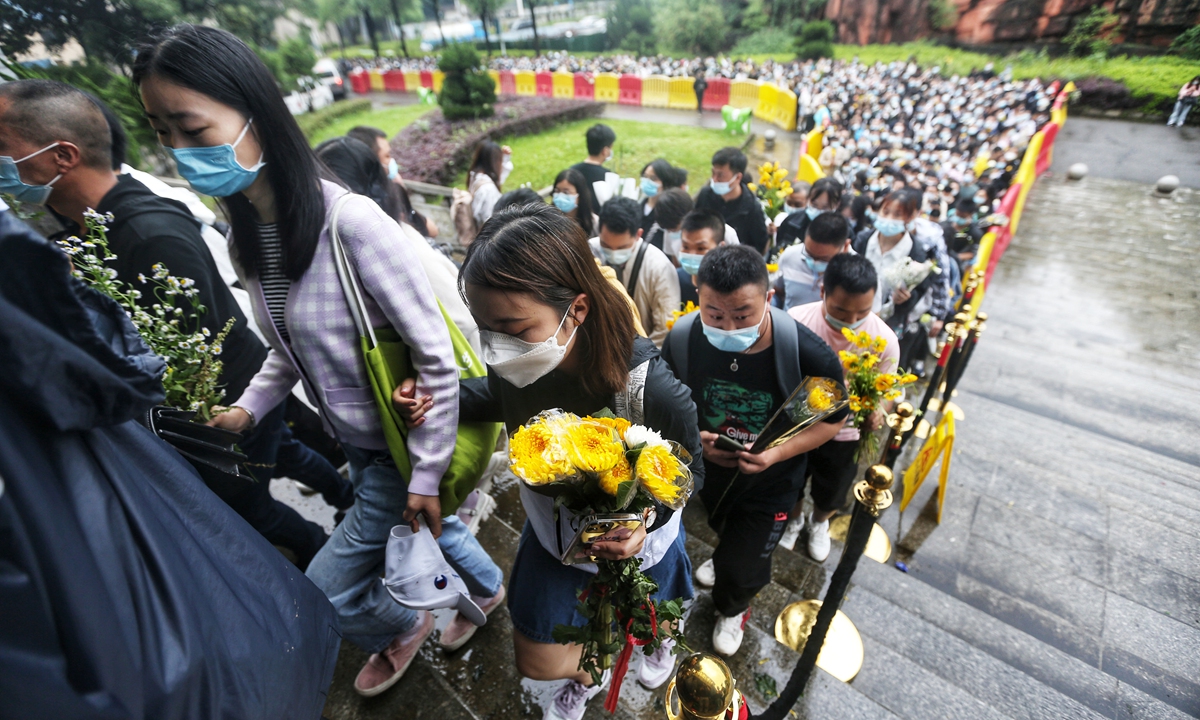
More than 100,000 people come to bid farewell to Yuan Longping in rain at Mingyangshan Funeral Home in Changsha, Central China's Hunan Province on Sunday. Photo: Cui Meng/GT
Nearly 100,000 ordinary Chinese people went to pay tribute to Yuan Longping, "the Father of Hybrid Rice", in front of the Funeral Home in Changsha, Central China's Hunan Province on Sunday, placing flowers and leaving thank-you note on site. More people have reposted pictures of Yuan on social media to mourn the great agronomist who contributed his life to help "fill the bellies" of the Chinese people.
Yuan, the pioneer of the research and development of hybrid rice in China and also the first scientist in the world to successfully utilize the heterosis of rice, has not only earned respect from Chinese people but also the global community as the hybrid rice technology has been promoted globally, lifting more people out of hunger.
Yuan passed away in Changsha at 1:07 pm on Saturday at the age of 91. Upon hearing the news, residents in Changsha waited in long lines along the streets to bid farewell to Yuan when a hearse took his body from the hospital and drove to the Hunan Hybrid Rice Research Center again - the place where Yuan had worked.
On behalf of Chinese President Xi Jinping, Xu Dazhe, secretary of the CPC Hunan Provincial Committee, visited the family of Yuan on Sunday and expressed condolences.
Nationwide mourningOn Sunday, despite the rain, more Changsha residents and people around China went to Mingyangshan Funeral Home to bid farewell to Yuan. The Global Times reporter observed that almost everyone carried flowers and some took a handful of rice grains and placed them in the corridors of the Funeral Home. According to the staff member, more than 100,000 people came to mourn Yuan on Sunday.
A man who flew from Shenzhen to Changsha surnamed Cao told the Global Times that he was entrusted with the task from his father to express gratitude to Yuan. The man's father came from Sichuan Province and suffered during a famine in his childhood. "My uncle died from hunger… my father said thanks to Yuan, there is no hunger anymore."
A 76-year-old woman took her son and two grandsons to mourn Yuan at the Funeral Home. She told the Global Times that she always wanted to say "thank you" to Yuan for helping Chinese people conquer hunger.
The woman's son also said he brought his two boys here to show them what a true hero looks like and hoped they grow up to be someone like Yuan.
"All of Yuan's students and members of his scientific research teams who work in various places were saddened by the news, but instead of grief only, we calmly ensured that work in the workstations was carried out in an orderly manner," Yuan's student Wang Shigang, director of the Yuan Longping Workstation in Hinggan League in North China's Inner Mongolia Autonomous Region, told the Global Times on Sunday.
Wang is responsible for the cultivation of saline-alkali tolerant rice in the vast saline lands of Inner Mongolia to increase the effective supply of grain and to optimize the local saline ecosystem.
In 2020, Yuan launched "Yuan's Dream Project" with the intention of opening up 200,000 mu (13,333 hectares) of salt-tolerant land for rice cultivation in Hinggan League.
Wang noted that the content and goals of their predecessor would not change, because it is an act that benefits the entire country and people with great significance. "Although Yuan passed away, we will convert our grief into strength and continue the work that he left unfinished," he added.
Many more people who could not go to Changsha chose to commemorate Yuan online. Some online platforms have been set up for netizens to pay tribute to Yuan and more than 5 million netizens have participated. The hashtags related to his death on the Chinese Twitter-like social media network Sina Weibo have been viewed more than 8.7 billion times on Sunday.
Since Saturday, netizens have been posting their gratitude and condolences toward Yuan and more netizens are paying their respects with campaigns such as "cleaning the plate." Some suggested that people should "eat every grain of rice while thinking of Grandpa Yuan!" Many netizens also said that they would bear Yuan's remarks saying "the bellies of Chinese people must be filled by ourselves."
Getting enough to eat; however, used to be a serious challenge in China. "I saw heartbreaking scenes of people starving to death on the road before 1949," Yuan used to say, according to a feature story of Xinhua. Thanks to the work that Yuan and his team have done, China is feeding nearly one-fifth of the world's population with less than 9 percent of the world's total arable land.
Yuan is widely known and respected among Chinese young people because he is one of the most famous figures which were frequently mentioned in Chinese text books.
Li Xiang, 32, a Beijing-based analyst on social affairs, said that the core reason why young people have also been touched by Yuan is that "the generations born in the 1980s, 1990s and 2000s are the first generations of people in China that have never really experienced hunger. They have no idea of what living through food shortages is like, but they learnt in schools and from their parents or grandparents that famine has always been one of the most deadly challenges to China throughout its history, which could kill millions and cause huge tragedy."
So young people in China understand that they are lucky and should be grateful to Yuan and other scientists for allowing them to be born in a country without famine or food shortage, Li noted.
"Teaching our children to conserve food, and be grateful for the hard-won living standards of today. This is all I can do to commemorate Mr Yuan," said a web user on Sina Weibo.
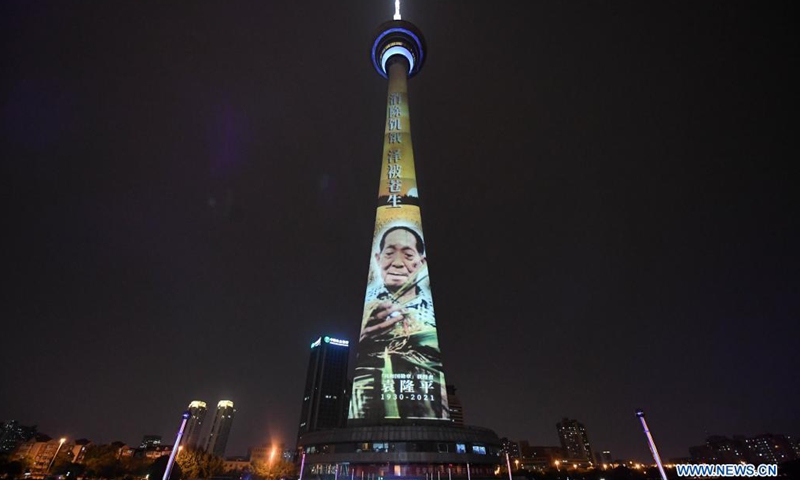
A landmark is lit up in remembrance of Yuan Longping in north China's Tianjin, May 22, 2021. Chinese scientist Yuan Longping, renowned for developing the first hybrid rice strain that relieved countless people of hunger, died of organ failure at 91 on Saturday.(Photo: Xinhua)
Global contribution Yuan's contribution has not only benefited Chinese people, but also changed the destiny of numerous people worldwide, especially in developing countries which were also haunted by food shortages like what China experienced in the past.
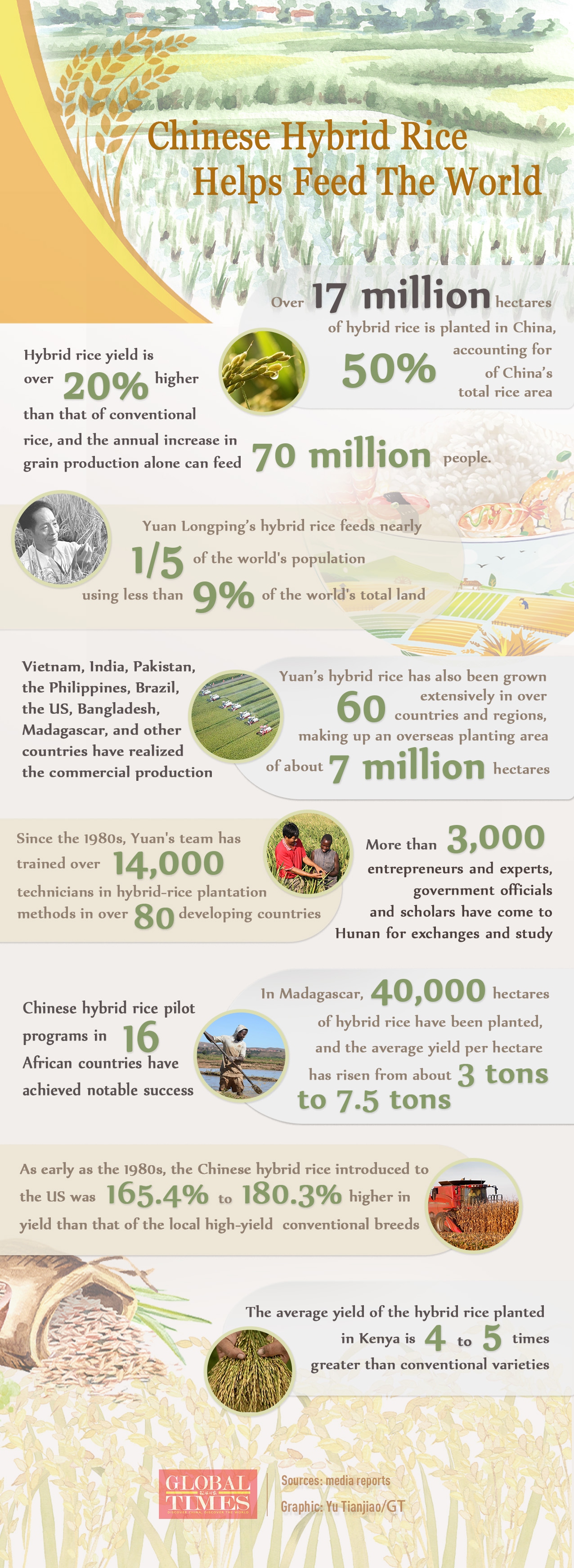
Yuan Longping’s hybrid rice feeds nearly 1/5 of the world's population using less than 9% of the world's total land.And helped feeding the world's population. Chinese hybrid rice has also been grown extensively in over 60 countries and regions, making up an overseas planting area of about 7 million hectares.
Since Saturday, people around the world also sent condolences regarding Yuan's passing. Abdul Jabbar Chandio, a Pakistani agrarian and research associate at The International Maize and Wheat Improvement Center wrote on his Twitter account that Yuan is a "global hero."
The UN mourned Yuan on its official Weibo account, saying that Yuan has made excellent contributions to improve food security and eliminate poverty.
"Today, we mourn the passing of a true food hero. Chinese scientist Yuan Longping saved millions of people from hunger by developing the first hybrid rice strain… his legacy and his mission to end hunger lives on," the Department of Economic and Social Affairs of the UN also tweeted.
Aside from feeding Chinese people, hybrid rice technology has been promoted in more than 60 countries and regions to help increase food security globally - from the Mekong River in Vietnam, Sumatra Island in Indonesia, the Indus Plains in Pakistan, to the hilly valleys in Nigeria, hybrid rice now has an overseas planting area of 7 million hectares.
Zheng Fengtian, a professor at Renmin University of China's School of Agricultural Economics and Rural Development, told the Global Times that hybrid rice has not only helped build China's food security, but also made contributions to global food security and stability.
The yield from hybrid rice is 20 percent higher than normal rice. Yuan not only helps feed more than 1.4 billion Chinese people but also makes underdeveloped countries buy food on the international market at normal prices as there is no need for China to buy food from international market, Zheng said.
Hybrid rice also brings benefits to developing countries. Apart from sending hybrid seeds to African and Asian countries, Yuan and other Chinese scientists also helped research and develop technologies to make the seeds fit into local environments, thus helping deal with food shortages, Zheng said.
In Africa, hybrid rice technologies have helped many countries overcome food shortage. For example, farmers in Madagascar who planted hybrid rice have yielded 7.5 tons of rice per hectare and the highest per unit yield was over 10 tons. The country is actively promoting the hybrid technology in order to realize self-sufficiency regarding grains, according to a release from the Chinese Embassy in Madagascar.
Aside from developing and promoting hybrid rice seeds globally, Yuan and his team also helped cultivate talent in more countries. More than 14,000 people specializing in hybrid rice and 3,000 scholars, scientists and officials from 80 developing countries came to visit Yuan's team in Hunan and conducted training, according to chinanews.com.








